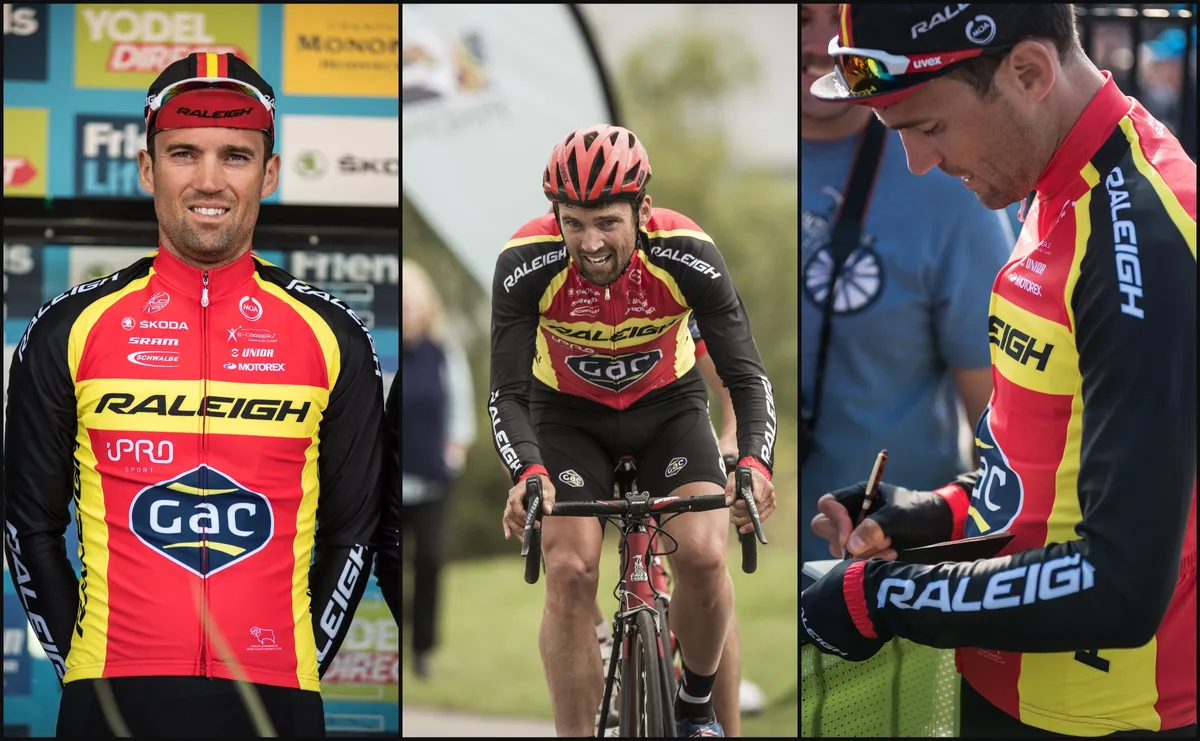Yanto Barker was competing for Team Raleigh during the Tour of Britain last week, finishing 93rd in the General Classification and helping the team to 11th overall, and second on the final stage.
And after a career spanning more than 10 years – including finishing ninth in the same event in 2005 – he was kind enough to share his racing wisdom with BikeRadar readers.
Yanto has been involved in professional racing for almost 15 years, including being in the Linda McCartney Racing Team and Team Raleigh. And it's because of his experience that we've asked him how he deals with training for a big race, the use of tech, nutrition and recovery to see how he operates come race time.
Read on for his advice, and be sure to check out our how to section (under Guides) to see how to make the most of your rides, how to get faster and much more.
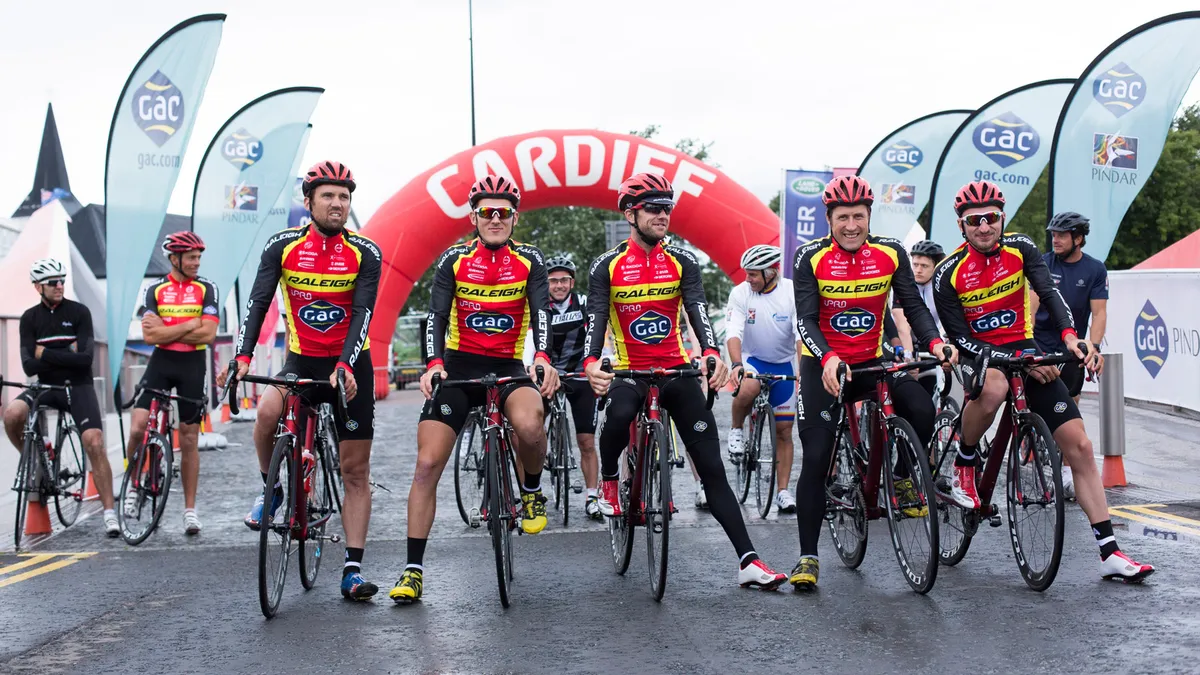
Team Raleigh on the start line of the first ever Cyclosail Cardiff with GAC Pindar
BikeRadar: How's the tour going this week? Are you happy with your performances?
Yanto Barker: Yes, I'm happy. We've always had someone in the break. We've also had a couple of stage placings. We're representing ourselves and our sponsors well. Obviously it's a fantastic opportunity and a great profile race, the following and support it gets on the side of the road is phenomenal compared to 30 years ago.
Do you see a big future for the Tour of Britain?
I think the future for the Tour of Britain being big is here, now, today. It's huge and it's also riding the crest of the wave of how popular cycling is in lots of different ways for lots of different reasons. To be here and take part, and enjoy the kind of attention we get on such a big scale, it's really important that we don't take it for granted and we try to build on it, because the more exciting it is the more popular it will be. It's an ever-increasing cycle. I take that seriously and I think it's important for us all to do our bit.
Have you had to tailor your training for the Tour?
Yep, absolutely. I always do this for objectives and this is an objective this season. So I work very closely with the coach, Steve Benson – I have done now for a couple of years – and we monitor what I'm doing and how my fitness is going and what the progression is so I can get to the start line in the best condition possible. But it does mean doing specific drills. There are lots of different things we've been doing for the last five weeks to seven weeks with this in mind, with a couple of other smaller objectives along the way.
Is there anything particularly new you guys are doing regarding training? Maybe in regard to preparing for races over the years?
Well, that's a very good question: actually what's interesting is that on the face of it you wouldn't notice much difference, but once you go into detail then there are some quite significant differences. And it's not really rocket science but it's the right thing in the right place at the right time to make that next step up. It's very easy – in a non-exact science – to get that wrong and actually be tired, undertrained or missing certain elements of your fitness. There's a lot of different things that go into creating the ability to ride at 55kph and then do a sprint at the end of it, so what we use nowadays – and I'm someone who used to only train with a clock, I didn't even use speed and distance – didn't seem to be necessary to me, but now I go through everything with a power file. I monitor and check my data and analyse it with my coach to make sure I am on track and that I'm doing exactly what I need to, almost to the minute every day.
That's probably something that has changed quite a lot. I know that a lot of guys do that now, and I have personally changed from the old school method to what would be classed as the new school method of being very scientific about it and being very exact, as opposed to if I feel it and let the cycling do the talking.
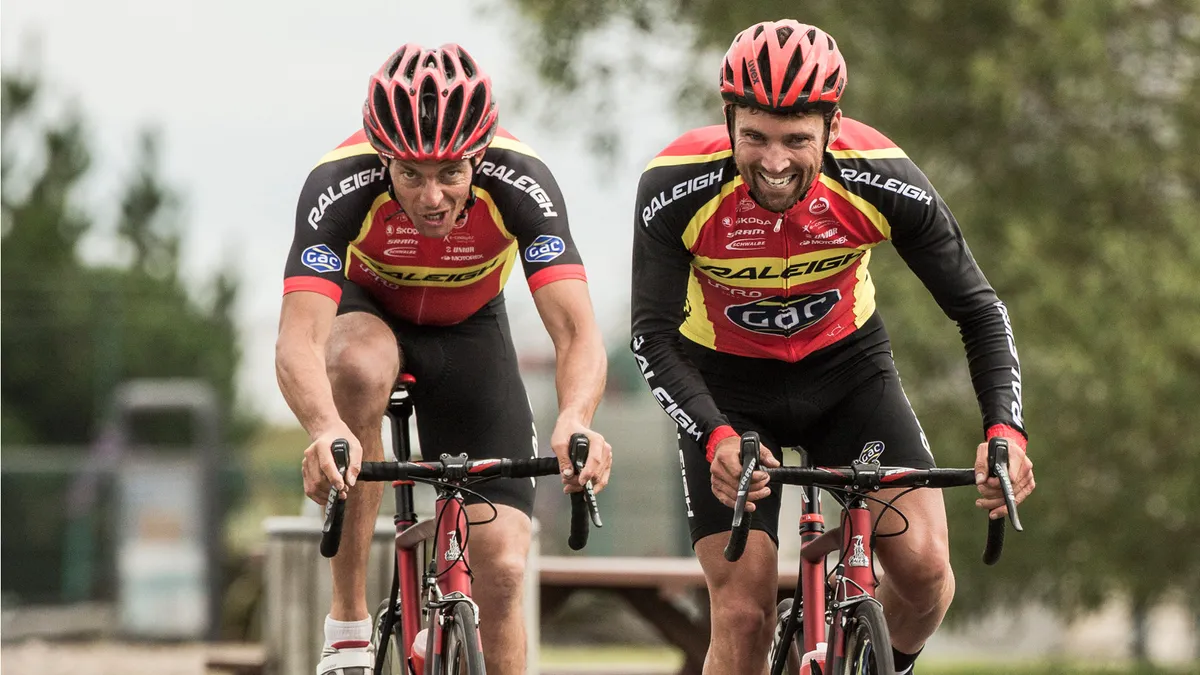
Training with the team
Any tips for our readers to replicate, regarding training for big races?
You can break it down to key principles. Your body is an efficient mechanism and basically wants to do the least possible to get you where you're going.
So when you're trying to get fitter you have to keep pushing beyond the body's actual limit at that time and if you don't then [the time limit] will progressively get smaller, and that is basically the principal of training. For instance if you don't do strength efforts, then your body will never fully use all the muscle at its disposal because it's just using enough to do what you're doing, and you're only using the superficial muscle so the underneath tissue doesn't get stimulated. Then it goes completely the other way and isn't getting exercise because your body doesn't need it.
So going through the training and certain exercises pushing the intensity and strength exercises is when it basically wakes that deep tissue up – your body ten starts to activate that muscle and train that muscle when it didn't think it needed it before and so it didn't use it at all, if that makes sense. There's a lot of that involved.
In a similar vein, regarding your bike setup, is there anything in particular about your tech setup you have changed over the last few years?
There's nothing really new from over the last 10 years – there's obviously advances but there's not been anything groundbreaking by any mean. There's always stiffness and lightness and aerodynamics, but that was always the case.
The greatest advances have been in clothing. If you look back to jerseys even as late as 2003 to 2004, then they were not anything near as aerodynamic as they are today. Honestly, if you gave a jersey to a rider today that they would have used in 2004, they would probably throw it back at you and say it's three sizes too big with flappy arms. And, critically, at absolutely max effort it's going to make the difference because you're doing 120 miles at, you know, 30 miles an hour – that's a lot of wind resistance and drag you've created for yourself and there just isn't the mileage to waste that and be competitive today.
Would something like disc brakes coming in make a big difference?
I don't think it would make a huge difference, I think it is an advance but I think the reason why it's taken so long to be introduced into cycling is because the standard breaking mechanism works perfectly well. It's a problem that doesn't really need a solution in lots of ways. I think there's probably an element of we want to get it in because there's a commercial reason to introduce it. And if they can create something that's desirable then everything's going to get updated, and that's good for business.
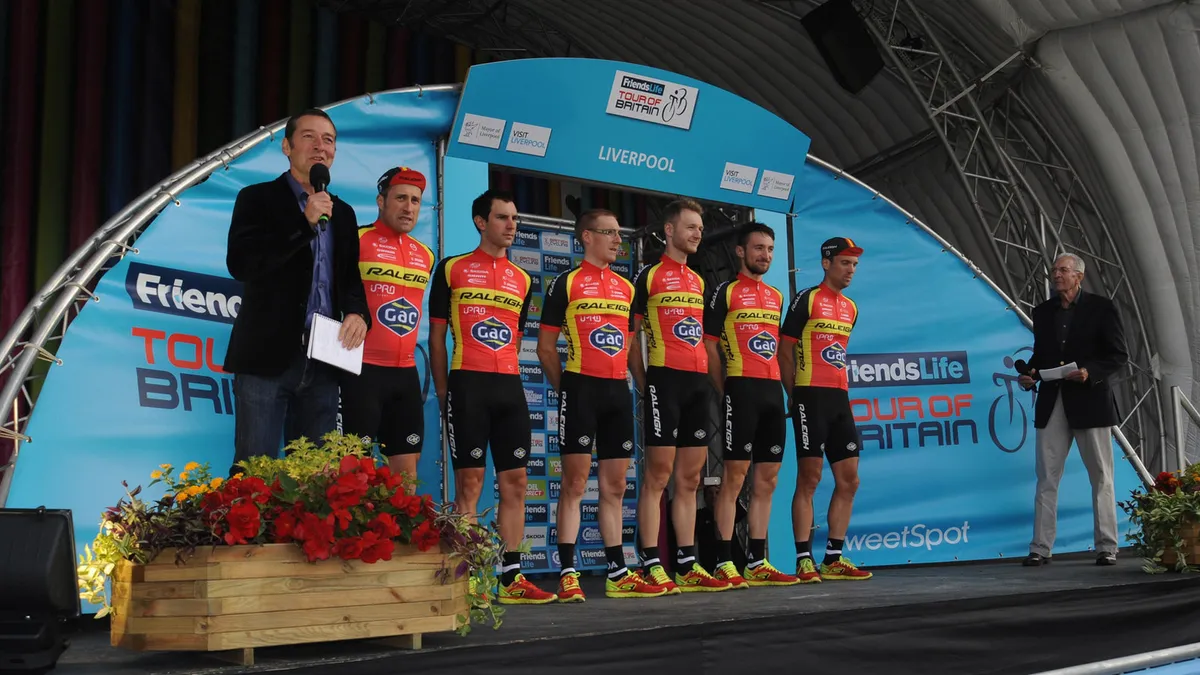
Team Raleigh on the podium being introduced
How important is nutrition with your training? How has that changed over your 10 years plus in the sport? Are you doing anything different nutrition-wise?
There's a couple of things that I do, but they're probably personal to me. The way I look at nutrition is basically three main elements. The first one is calories in, calories out. You have to be aware. You don't need to calorie count specifically, but you do need to be aware when you're eating too much or too little, and I prefer to eat more or less as opposed to cutting out food that I may enjoy, even though it's not the best nutritionally. But it's one of those compromises, and a little bit of everything is okay.
The second thing is the nutrition element. For instance, you've got to give yourself the building blocks, otherwise you're going to give yourself a lot of trouble, especially on consecutive days and hard training for stage races because your body needs to repair itself – that's absolutely key. So once you've covered those two basic principles then, in moderation, you can get away with most things, especially as we're endurance athletes and we're burning 6,000 to 7,000 calories a day on a day like today, on the Tour of Britain, for instance. So it's not a huge concern, because you can cut out 1,000 calories and still have three good meals a day. It's not like we're on a diet at low exercise levels where we would only be eating 2,000, and to cut that in half means missing one-and-a-half of our three meals a day. So when you put it in that perspective, the proportion of calories you have to work with is a lot, which makes it easier to gain or lose in lots of different ways.
The last element, which I take seriously because I have a very sweet tooth, if I'm really on a push to lean up a little bit or just be a bit more serious then I tend to replace my sugars with honey or some natural fruit sugars. I do notice that it makes a little bit of a difference but I do like [sugary stuff] and I usually eat it in moderation, but that is an area for me to make a push in.
And recovery? Any tips for aspiring racers? Are you relaxing at home tonight, for example?
We're at the hotel and we had a transfer here which was about an hour-and-a-half, which is done on the coach. I have a routine that I do, training at home. I'm a man of routine. I run a business as well, so I like my processes because it's the process that keeps everything on track and you don't need to think creatively all the time, because you've designed the process to do exactly what should be done.
So when I get back from training I do a stretching routine. I usually roll – using a roller – which I find is very helpful. And the roller is something new to me; I haven't done that before or this year.
Obviously the stretching then, because muscle condition is a key part of your performance and it doesn't matter how big your heart and lungs are if you haven't checked your muscles are in good condition. That means stretching and rolling and getting the toxins out, then they cannot get close to delivering their potential, for instance your legs have to be strong enough to make your heart and lungs get to their capacity. And the fatigue happens more quickly in your muscle condition than it does in your cardiovascular system so, really, your weakest link of the whole fitness chain is your muscles.
So you have to pay a bit more attention to them than anything else to make them stronger and to keep them from deteriorating, and making sure they recover as quickly as possible. I go through a routine of about 30 to 35 minutes after every ride and if I don't, then I can feel just a little bit of tension creeping in and the efficiency dropping off a tiny bit. I've been doing this a long time now and I can feel the difference.
What about for the rest of an evening after a race? Will you have your feet up and be watching TV?
I'll almost always be sitting down, and the only time I stand up is to walk to get from A to B and then feet up on the bed or even up on the wall to let that drip through, drip back down and get all that recovery system working better.
Global logistics provider GAC are sponsors of Team Raleigh-GAC.
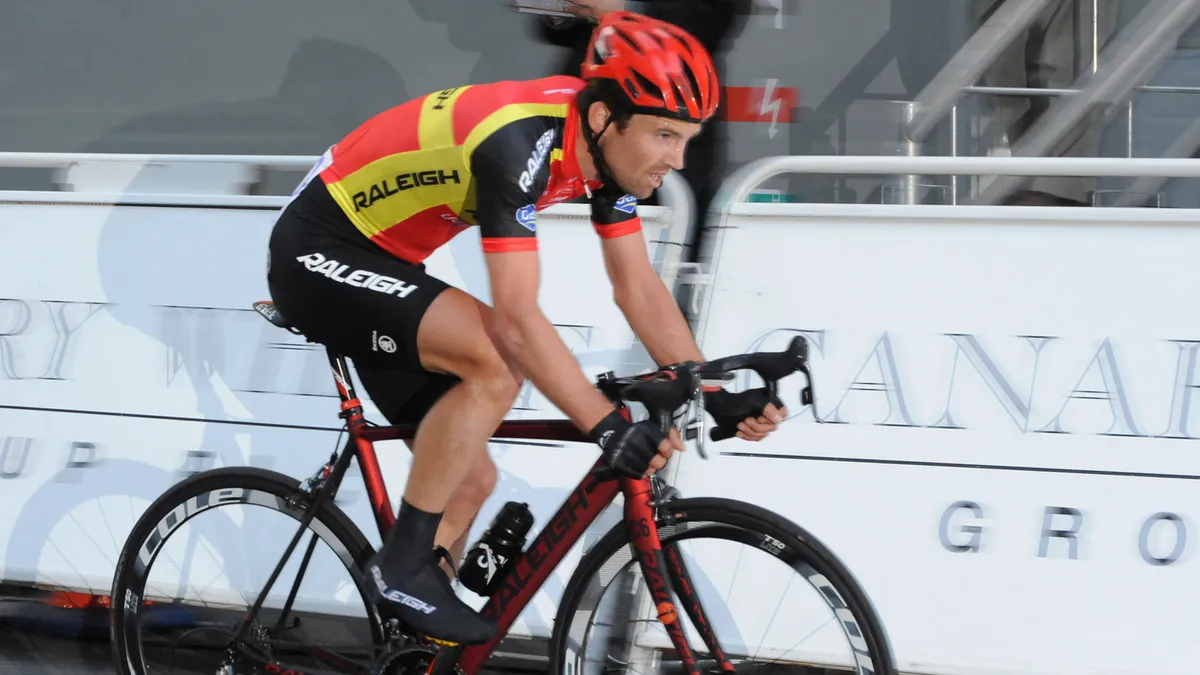
Yanto during one of the Tour of Britain stages
